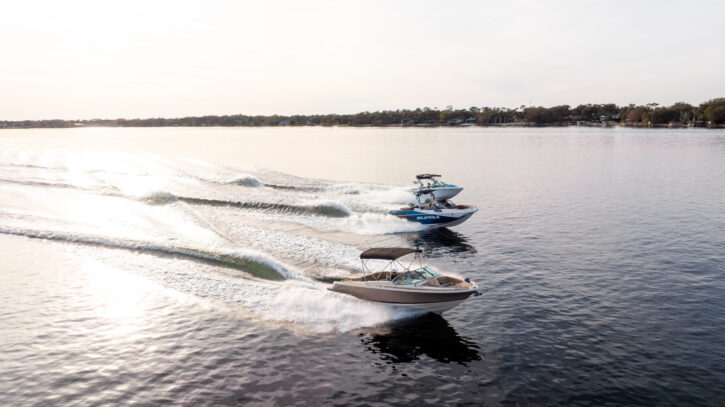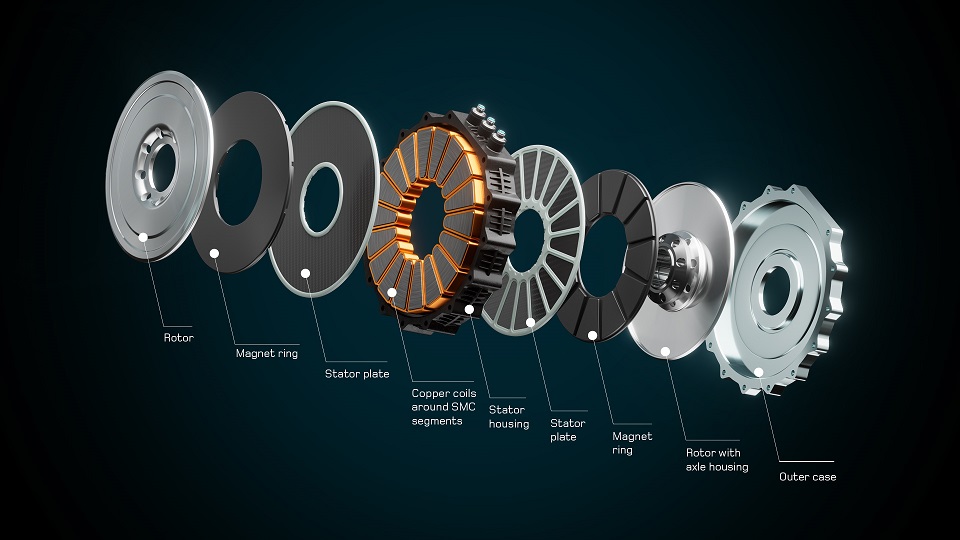YASA is already a firmly established name in the automotive sector, and its axial flux motor technology seems a natural fit for the next generation of marine propulsion systems. E&H Marine speaks with Jon Whitehouse, senior business development manager, to find out why the state-of-the-art motor technology is suited to maritime applications, and how the sectors have more than a little crossover.
How long has YASA been active in the marine sector?
YASA has been active in the marine sector for more than a decade and has been involved in pure-electric propulsion, hybrid propulsion, generation and auxiliary systems projects. One of our earliest marine projects was supply of a lightweight motor to Griffon Hoverwork. The lightweight nature of the motor was particularly valuable in a hovercraft application where the craft flies above the water – that same light weight is now very appealing in foiling craft applications, for example, which are also weight sensitive.
As in the automotive market, our focus is on high performance. We are known for supplying highly-power, dense, compact, lightweight motors to companies such as Ferrari for their first hybrid supercar, the Stradale SF90. That same power-dense axial flux motor technology is now bringing new levels of performance to small craft marine propulsion.
A great example of pushing the boundaries of marine performance was our work with Williams Advanced Engineering (Fortescue Zero) and Jaguar on the Jaguar Vector V20E. In 2018, Jaguar set the electric water speed record on Coniston Water in England’s Lake District after the boat recorded a top speed of 88.61mph (142.60km/h).
Can you give us an idea of some of the applications that are suited to YASA motors?
The YASA electric motor is ideal for series hybrid applications where the short axial length of the system enables a more compact installation in the boat. The electric machine can be installed between the engine and the gearbox. The through shaft capability enables the ICE to drive through the electric machine, which can add power or generate electricity depending on the operating mode. It’s then possible to downsize the ICE, increasing efficiency while maintaining the overall propulsion system power. A hybrid propulsion system can then also offer the benefit of different operating modes such as low-speed pure-electric propulsion, or generating electricity to charge a high-voltage battery to support hotel loads at anchor without the need for a separate generator.
The high torque and low-speed characteristic of our technology also lends itself perfectly to pure-electric marine propulsion. The axial flux motor topology, where the rotor covers the full diameter of the stator, generates high torque. And in a YASA motor, where the highly efficient direct oil cooling of the stator enables very high current densities and therefore high magnetic flux densities, this further increases the deliverable torque.
The benefit of the high-torque low-speed characteristic is that, for many applications, it is possible to have a direct drive solution without the added weight, cost and space of a gearbox. Today YASA’s technology offers new opportunities across the marine sector, from high-performance small craft propulsion applications through to diesel and gasoline hybridization.
How has expertise gained from automotive helped YASA turn its hand to marine propulsion systems?
Expertise, experience and forensic electric motor know-how achieved within the demanding supercar environment has resulted in the creation of a state-of-the-art electric machine able to be coupled with a conventional ICE for high-performance hybrid applications across the marine spectrum. Of course, there have been some learnings the other way as well – the very high duty cycle in marine propulsion has driven innovations that increase continuous performance and benefit demanding automotive use cases.
What are the characteristics of axial flux motors that lend themselves to use in marine systems?
Light weight is a key attribute of the YASA axial flux electric motor. But in marine applications, the critical attributes are more often the optimally short axial length, high torque at low speeds and very efficient direct cooling.
The optimally short axial length helps deliver a very compact hybrid powertrain, maximizing aft cabin space in a motor cruiser for example. The high torque at low speeds directly enables drive solutions without the need for a gearbox, thereby delivering a lower cost and highly compact solution with greatly reduced noise and vibration levels. Finally, the efficient direct cooling arrangement enables high continuous power usage, a key factor needed across many marine propulsion applications.
What sort of vessel types and use profiles would benefit from using axial flux motors?
The most obvious marine applications to mention are high-performance small crafts for leisure use, which benefit from utilizing YASA axial flux technology – as our motors offer the required high performance in a very compact package. Another type of marine application that stands to benefit greatly from adopting the lightweight YASA axial flux motor is foiling craft given their weight sensitivity.
Does the technology require any additional adaptation for use in marine environments?
Thanks in part to an advanced architecture that features high-grade aluminum alloys and high-tech composite materials, the motor is not only lightweight, compact and very powerful, but also incredibly durable and reliable, having been designed to operate in the harsh and demanding marine environment.
How easy is it to integrate YASA systems into vessel propulsion layouts?
The motor has been developed to seamlessly integrate within OEM architectures. For example, the short axial length and compact size are key enablers for OEMs to realize easy integration into a wide range of marine propulsion systems.

Does YASA have any marine-specific products on the horizon, or will you continue to develop motor technologies for use in multiple sectors?
On-going high-tech automotive development will enable YASA to offer electric motors in the marine sector with even higher power and torque densities with lighter weight and optimal packaging in the future. YASA prides itself on being highly innovative, therefore expect next-generation systems that set new industry standards to be showcased in due course.
Axial flux technology will play a key role in the sustainable transformation of the marine industry, particularly for small craft, enabling reduced emissions and lower noise in high-performance next-generation marine propulsion systems.
YASA was among the exhibitors at this year’s Electric & Hybrid Marine Expo Europe. You can read the review of this year’s edition here.
For more on pleasure and leisure craft, see the April issue of Electric & Hybrid Marine Technology International.





